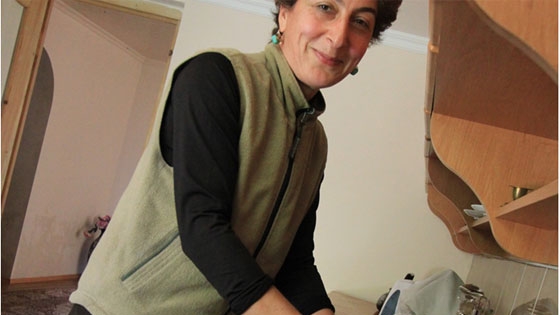In Gori, Lily Tskhovrebashvili, used to rise at dawn to fill buckets and carry them home. Now water is piped to her house around the clock. "This is a huge relief. I assure you that every Gori resident feels the same way as I do. Sometimes I forget that I have 24 hour water supply and when I see water running in the tub, I immediately run and turn off the tap so as not to waste precious water," Tskhovrebashvili says.
Pumping stations—some of them untouched and unmaintained since they were built in the 1960s—have been upgraded. The decrepit pump in Tskhrmukha only pumped water an hour or two every few days. Since undergoing repairs, it now pumps enough to supply half of Khashuri's citizens at one time. Once work is finished, the pump will be more energy efficient and powerful enough to supply all of the citizens all of the time. But to get the water to them, water pipes still need work—a lot of it.
Omar Khajarelidze, technical supervisor of construction at Tskhrmukha, says: "Water pipes need to be repaired. In some places, they need to be replaced by new pipes, in others, there are no pipes at all. We hope that the World Bank will finance the third stage (of this project) and that every family gets water without delay."
Overall, the project has increased piped water services from an average of seven hours a day to twelve. It has brought piped water to 30,000 households that previously were not connected to the system, and given access to improved water to another 90,000 people. And it's making it easier for the private sector to do business.
A baby food processor has expanded production since the water supply became reliable. "The water supply was sometimes cut when food processing was underway. We did not know when it would be restored or whether it would be cut again. Sometimes we did not have a schedule at all. Consequently, the production process was hampered. In 2009 this problem started to be eliminated step by step. The process ended in 2010. Since then we have had a 24 hour water supply. The main obstacle of cutting water during the food processing has been eliminated. This gave us the opportunity to expand production."
The Regional & Municipal Infrastructure Development Project has a total cost of $65.4 million, of which $40 million equivalent is International Development Agency (IDA) credit. In 2010, the project received additional financing of $45 million ($33.5 million IBRD and $11.5 equivalent IDA), which made the total project cost $124.2 million.
Georgia appears to be on target to achieve the Millennium Development Goals pertaining to water and sanitation by 2015.

